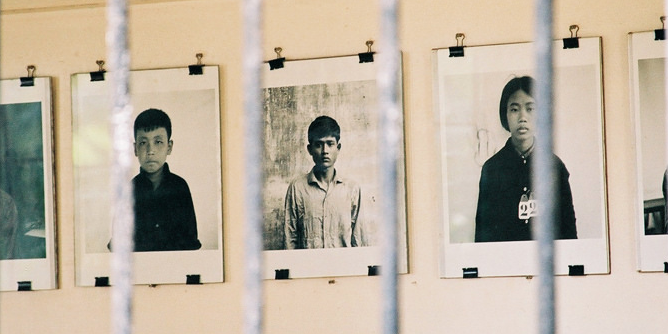The Forgiveness Dilemma: Emotions and Justice at the Khmer Rouge Tribunal

In post-conflict politics, the practice of forgiveness is marked by a serious dilemma. For its proponents, forgiveness is the panacea for entrenched anger and resentment: negative emotions that left unchecked inspire revenge, hamper reconciliation and jeopardise peace. However, forgiveness can also provoke anger and resentment by heaping hurt upon hurt and injustice, perceived or otherwise, upon injustice. How, then, can victims and survivors of serious harms be afforded the opportunity to overcome the negative emotions in ways that do not provoke new grievances or renewed resentments?
Many post-conflict societies use truth commissions as outlets for victims to tell their stories and overcome their negative emotions. Yet, this is not the only solution to the forgiveness dilemma. An alternative approach, which takes the nature of the negative emotions themselves into account, is victim participation in human rights trials. This is what took place in Case 001 at the Extraordinary Chambers in the Courts of Cambodia (ECCC).
ECCC trial case 001
In the late 1970s, the Khmer Rouge in Cambodia systematically murdered at least 1.7 million people and subjected countless others to various forms of torture. The first case heard before the ECCC was that of Kiang Guek Eav, alias Duch, head of the S-21 prison camp.
It is estimated that 17,000 individuals, including young children and babies, were imprisoned and killed at S-21 and its associated execution site. More than 30 years later, this would become the setting at which forgiveness became a notable theme of Duch’s trial.
During the investigation phase, the accused agreed to visit S-21 for the purposes of reconstructing events. There he met with three of the seven S-21 survivors and, in a surprising turn of events, asked for their forgiveness. ‘I ask for your forgiveness – I know that you cannot forgive me, but I ask that you leave me in the hope that you might’, he said, before collapsing into tears on the shoulder of one of his guards. Statements such as this, as well as expressions of sorrow, remorse and regret, would later mark the lengthy trial.
The victims questioned whether Duch’s actions were simply unforgivable; debated what forgiveness would actually entail in this context; considered its therapeutic benefits and harms; puzzled over the role that apologies and expressions of remorse play in fomenting forgiveness; and considered whether righteous anger and resentment ought to be overcome in the face of such manifest injustice.
Duch’s last-minute decision to change his plea to “not guilty”, as well as his attempt to appeal the Trial Chamber’s verdict and sentence, also led many to doubt the sincerity of his remonstrations. In short, the discussions that took place throughout Case 001 echoed broader scholarly arguments about the nature of forgiveness; its justifications, requirements and constitutive actions; and the ethics of forgiving seemingly unforgivable crimes.
Forgiveness and revenge at the ECCC
Forgiveness is concerned with overcoming negative emotions, practised in the interests of improving the psychological outlook of the victims of wrongs, to avoid revenge and to facilitate the building of positive relationships and reconciliation. It seeks, at a minimum, to mitigate the negative effects of the negative emotions and, in a maximal sense, to replace them with positive emotions and their associated actions. Yet, the negative emotions also drive human beings to pursue justice and to right wrongs. As such, overcoming them is not without costs.
Despite Duch’s repeated pleas and the prominence of debate surrounding forgiveness at the ECCC, not one of the 22 civil parties who testified before the ECCC offered forgiveness.
In a statement read by her uncle in court, one woman, whose father was killed at S-21, explained: “To grant forgiveness boils down to admitting that the atrocities committed do not touch us deeply.” For her, the decision not to forgive was based, at least in part, on the sense that forgiving would mean both wiping the slate clean and relinquishing her own negative emotions.
Yet, most victims agreed that some of their more extreme emotional responses had faded or dissipated as a result. S-21 survivor Bou Meng said: “Testifying helped me release some anger”; Neth Phally agreed and stated that: “When I left the courtroom my feelings had been eased”. That is, most of those who testified overcame their negative emotions without forgiving.
This sort of experience is consistent with the notion that “revealing is healing.” Brandon Hamber, for example, argues that “psychological restoration and healing can only occur through providing space for survivors of violence to be heard, and for every detail of that traumatic event to be re-experienced in a safe environment.”
In the case of the ECCC however, another ingredient was significant: justice. Not only were those who testified provided an opportunity to express their negative emotions, but in doing so they contributed to the pursuit of justice.
The moral dilemma
Forgiveness bestows therapeutic benefits on both the victims and perpetrators of wrongs, helps avoid ongoing cycles of revenge and contributes to personal and societal reconciliation. But its is not a simply “good” endeavour. Rather, it poses a moral dilemma. Forgiveness, at its core, requires us to overcome our darkest emotions – most commonly, anger and resentment – the same emotions that drive us to pursue justice.
As the case of the ECCC reveals victim participation in human rights trials can play a significant role in allowing the victims of serious wrongs the opportunity to overcome their negative moral emotions without necessarily requiring forgiveness.
In allowing civil party participation in its criminal trials, the ECCC provided the sense of formal retributive justice that many victims desire. In particular, it allowed the negative moral emotions experienced by many victims to be channelled into the pursuit of justice, thereby making an emotional manifestation other than revenge possible. At the same time, the ECCC managed to avoid precipitating the sorts of negative emotions often associated with forgiveness by not mandating or expecting forgiveness on the part of victims.
Although the ECCC does not demand forgiveness from the victims of the Khmer Rouge, it did not preclude it either. On the contrary, the pursuit of justice may itself facilitate forgiveness when and if the victims so desire. Rather, the point is that the decision to forgive remains the sole prerogative of the victims. As psychologist Chhim Sotherara noted in his testimony: “It’s going to be a long, drawn-out process for forgiveness or the seeking for forgiveness”. Until then, it has made a significant contribution to overcoming the negative moral emotions of some of those who suffered at the hands of the Khmer Rouge.
Renée Jeffery is a Professor in International Relations at Griffith University. This piece is adapted from her article of the same title that appeared in the Australian Journal of International Affairs in February 2015 which received the Boyer Prize for best original article to appear in the AJIA in 2015.





